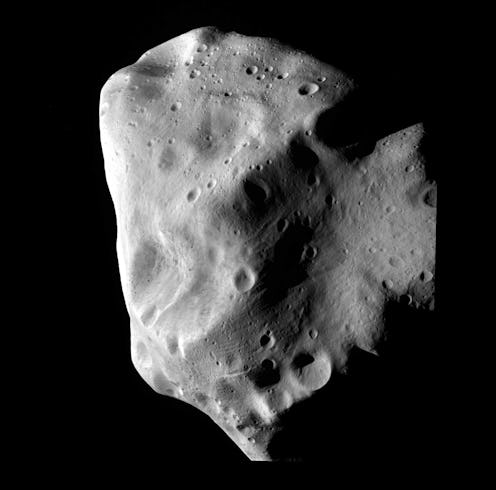Life
This Newly-Discovered “Alien Asteroid” Could Tell Us Where Our Universe Came From

Astronomers, physicists, and scientists have a pretty good understanding of what's going on in space. They account for nearly everything — from all of the moving and stagnant debris to satellites and all of the stars in our solar system — and they've got eyes and lenses on everything. But when it comes to the asteroids surrounding Jupiter's orbit, there's one that has experts scratching their heads. You're going to want to know what an alien asteroid is, because that's what we're calling 2015 BZ509 (BZ for short) — the asteroid whose wacky behavior just might prove that it's not from our universe, as well as tell us a lot about our own galaxy's history.
While Jupiter has a ton of asteroids swarming around it (over 6,000 to be exact), they don't stand out because they're all moving in the same direction. BZ is a different story, though: it goes against the grain, literally. With an egg-shaped orbit that moves in a retrograde motion (aka, backwards), BZ has been on scientists' radars since 2014, and has also been stumping the brightest minds since then. But now, Fathi Namouni of the Observatoire de la Côte d’Azur in France and his colleague Helena Morais of the Universidade Estadual Paulista in Brazil have made a pretty massive discovery about BZ that could change everything. In an article in The Royal Astronomical Society Monthly Notices, the duo revealed that they basically discovered they officially don't know a lot about BZ... which is a discovery in and of itself.
You see, we know a lot about asteroids that originate in our galaxy — they have behaviors that we can recognize. But BZ's behavior is so foreign, Namouni believes it's likely from another solar system, aka, actually foreign. Namouni made a computer simulation to hypothesis about BZ's history. The program traced the motions of our solar system all the way back to its inception, 4.5 billion years ago. Based on how stable BZ's orbit is, it's thought that it could even stay on track for another 45 billion years. And according to the computer simulation, there's no way BZ could have been created by natural process in our solar system. The computer program could not find a reasonable excuse for an asteroid in our solar system to be behaving so differently than all of the other asteroids in our solar system. The program essentially ruled out the possibility of this asteroid being part of our solar system's fundamental history.
The conclusion here is that if BZ is rogue and so unshakable, it must have not been around in our solar system for the big bang. It must have been in another solar system and gotten sucked into Jupiter's gravitational pull early on in the history of our solar system. Technically, that makes the alien asteroid a literal alien in our universe, as it's been here much longer than we have, and will be here much longer than we will.
That said, the discovery of BZ is much larger than one asteroid's history. It's a foundation of understanding that astronomers can now use to identify other asteroids that have similar atypical orbits. The more similar seemingly alien asteroids that we are able to study, the more likely we are to find information that will help us trace them back to where they actually came from, giving us invaluable information about how the entire solar system was created. If we can trace an alien asteroid back to its origin, we can expand our understanding of the shape, history and geometry of space. An alien asteroid is a clue from the places we haven't yet discovered, which makes it a pretty lucky visitor for us, if you think about it.